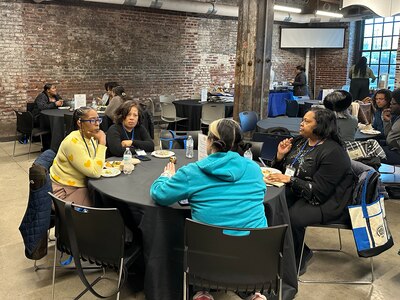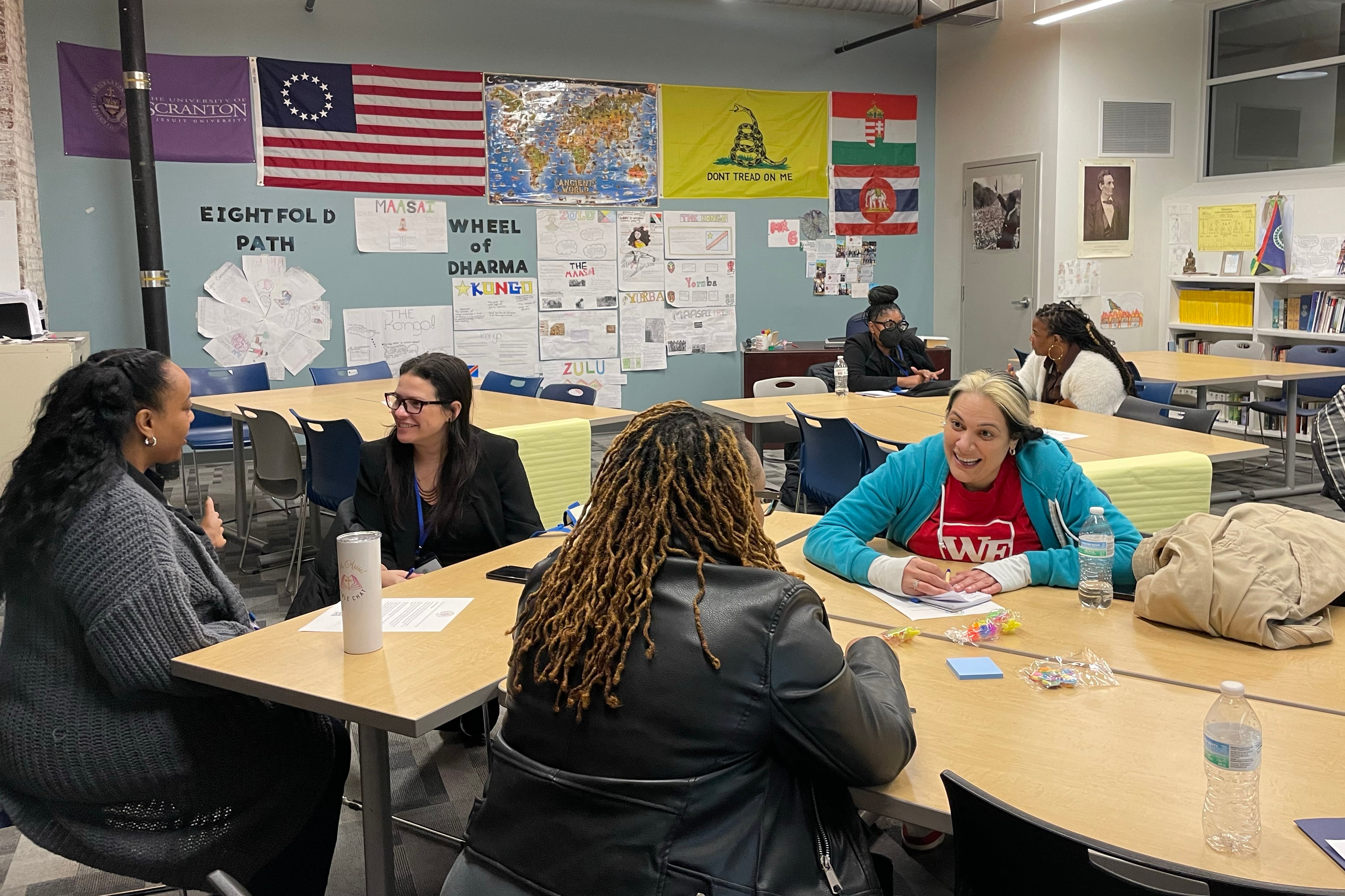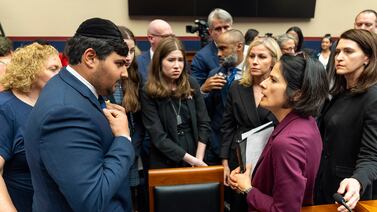Sign up for Chalkbeat Philadelphia’s free newsletter to keep up with the city’s public school system.
Can affinity groups for teachers of color help give Philadelphia a stronger, more diverse, and more stable teaching workforce? One education group is putting time and energy behind its belief that they can.
Teach Plus Pennsylvania, the state affiliate of a national nonprofit that trains teachers to advocate for policy change, launched a Philadelphia affinity group network this year that they say will provide teachers with a sense of community, belonging, and understanding in an effort to “diversify and strengthen Philadelphia’s educator workforce.”
Philadelphia public school teachers of color from traditional public or charter schools can join one of 21 teacher-led groups meeting in classrooms, coffeeshops, and other locations across the city.
The goal is to create “safe, culturally affirming spaces where educators of color can develop personal and professional connections that ultimately support and empower them and encourage them to stay in the profession,” said Andrea Terrero Gabbadon, an expert on teacher retention and an education leadership coach with Teach Plus Pennsylvania.
Any effort to tackle systemic labor force issues in Philadelphia schools faces an uphill climb. In 2022, teacher attrition rates in the city reached their highest levels since 2018, with 13% of traditional public school teachers and 23% of charter school teachers leaving the classroom, according to research by Ed Fuller at Penn State’s Center for Evaluation and Education Policy Analysis. Fuller found that the highest attrition rates were for early-career teachers with up to five years of experience.
Additionally, the share of teachers of color in Philadelphia is low compared to the student body makeup, and nationwide, they are leaving the profession at growing rates. Black students in Philly also say they want more teachers who look like them.
The extent to which affinity groups can help keep teachers on the job at scale is still unknown. Teachers leave the field for a variety of reasons, from low salaries to big workloads and a lack of support, that such groups might not be able to address. And affinity groups that are racially exclusive and officially backed by schools can be controversial and present legal issues, although the Philadelphia district is not involved in or sponsoring the effort by Teach Plus.
Laura Boyce, executive director of Teach Plus Pennsylvania, said affinity groups like these are showing early promise in other states such as Illinois. In a 2021 report on how Philadelphia could improve its recruitment and retention of teachers of color, Teach Plus and the Center for Black Educator Development recommended that they have “access to mentoring and affinity groups.”
“It’s an experiment to see, can we actually improve retention in a measurable way for the facilitators and participants in these groups and hopefully create an environment where they feel seen and valued, heard, affirmed, and supported to continue in this work?” Boyce said.
And Terrero Gabbadon said the new Philadelphia affinity groups are “part of a larger strategy” to tackle “systemic issues” that push teachers of color out of the profession.
The Philadelphia district already offers similar racial affinity groups, but they’re only for principals and assistant principals. Brandon Cummings, the district’s deputy chief of leadership development, said the district has been engaging in these group discussion sessions — which they call “think tanks” — for four years, in addition to other equity-centered initiatives.
Cummings said his office handles the logistics of finding locations, getting food, and organizing virtual meetings if needed, but that otherwise, the district doesn’t “intrude or in any way insert ourselves” into the groups’ activities. He said the district wants the people in the groups to direct their own conversations.
Morgan Craig-Williams, a kindergarten teacher at General George A. McCall School and a facilitator of the Black educators affinity group, said having a space that does not involve administrators or “anyone who will give any punitive action or higher ups in the school district” is crucial to their success.
Craig-Williams, who is in her ninth year of teaching, added that “teacher burnout is very real” in the city.
Creating community but also pushing for change
Stephanie Felder teaches African American History at Tacony Academy Charter High School and is the facilitator of the mid-career African American educator affinity group. She said the program has been “life giving.”
Though many of her peers are leaving the profession, Felder said she’s already made “a solid decision to stay.”
For her, the affinity group discussions have been “more about ‘how can we at this stage in our careers, help make it better for those coming up behind us. Help make it better for the students that we serve, and help make education across the board more than what we are seeing right now.’”

Cristina Gutierrez, a bilingual educator at Lewis Elkin Elementary School in Kensington, facilitates a group of Latino and dual-language teachers of color. She said often, people get emotional in group settings when they talk about an experience in the classroom or the difficulty of advocating for bilingual education “and feeling like you’re the only one” going through it.
“We don’t have a cohesive system with bilingual education in Philadelphia,” she said.
Gutierrez said she wanted to create a space for multilingual educators to come together and discuss the challenges they face “and let our voices be heard.” But it’s about more than just talking about struggles, she said.
“It’s like the thing that you need, but you don’t know you need,” she said. “Yes, we create community, but we could also create a lot of change.”
Boyce said the aim is not to have gripe sessions or tell teachers of color to “go figure it out and solve it yourselves” but rather to develop “two-way communication and being able to elevate … some concerns and systemic solutions and really all learn from this work.”
Through her group, Craig-Williams connected with an educator who has been in the classroom for nearly 25 years. The two women text daily, she said, and swap tips about how to navigate school culture and deal with difficult days.
“She was a complete stranger before we set up these affinity groups,” Craig-Williams said. “Now, that’s a connection that I’ll probably keep forever.”
The moments she’s shared with her group members feels like the start of something bigger.
“These affinity groups are the beginning of us coming together and rewriting the structure of education,” she said.
Carly Sitrin is the bureau chief for Chalkbeat Philadelphia. Contact Carly at csitrin@chalkbeat.org.








